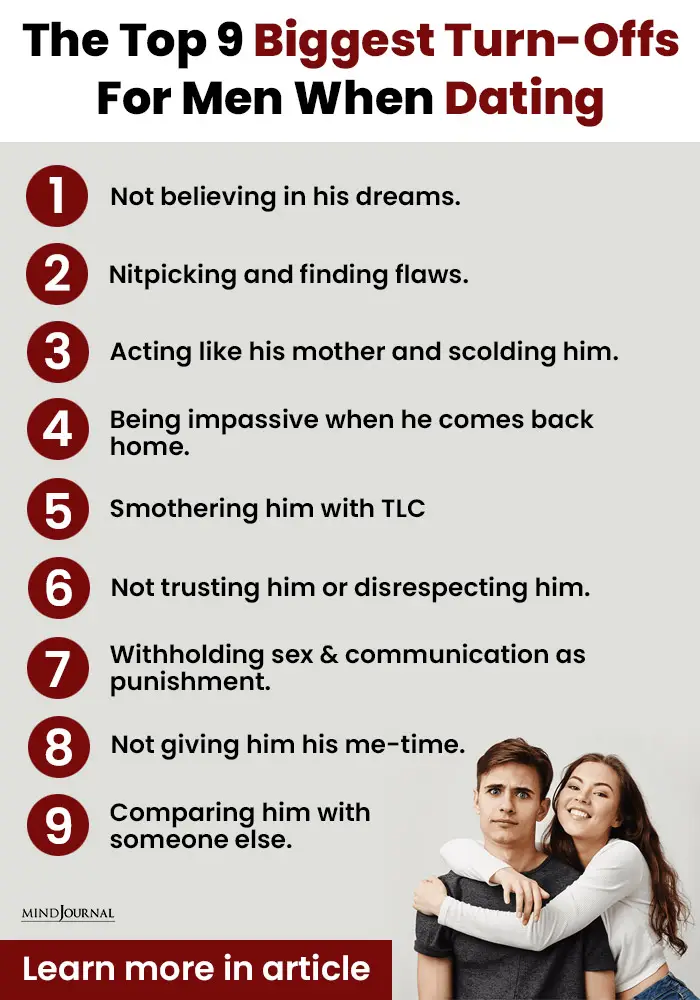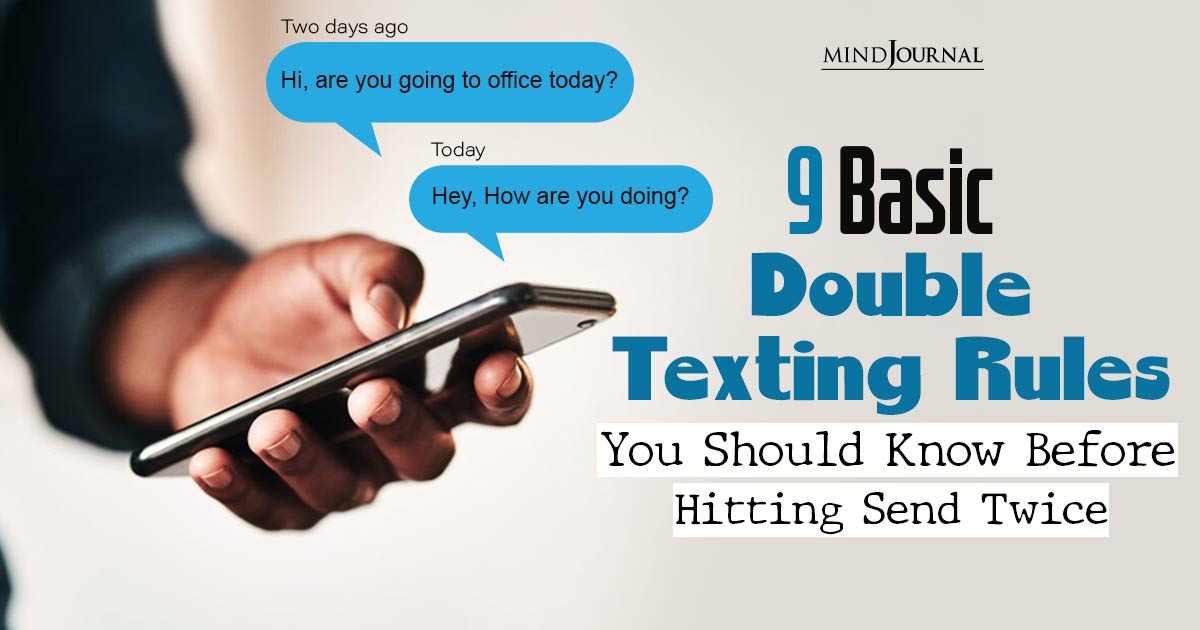It is always about how a man should keep the woman in his life happy and satisfied. What about the biggest turn-offs for men when it comes to dating and relationships?
What about what men want? What are the biggest turn-offs in a relationship from a man’s perspective?
Whenever you come across anything related to turn-offs in a relationship, you will come across all sorts of advice about what women need from their men in order to be truly happy. It’s seldom about the things that are turn-offs for a man.
Men also deserve to be loved, appreciated, acknowledged, and understood. They also have many expectations from their partners, but they might hesitate to talk about all that.
That doesn’t mean they don’t want to feel good, or they don’t want to be taken care of. So, let’s talk about the biggest turn-offs for guys, for a change!
9 Biggest Turn-offs For Men In Relationships
Here are the top nine turn-offs for men when dating

1. Not believing in his dreams.
Men want their partners to be their cheerleaders and they always want their partners to believe in their dreams. Every man wants his significant other to stand by them and their dreams, and support them till the finish line. Most men might not express this explicitly, but they do want their partner to be there beside them like a rock.
No man wants to be around a woman who discourages him or doubts his dreams. This is one of the biggest turn-offs for men when they are dating someone. If their partner does not understand them and believes in them, they would rather be single than be with someone like that. Men want women who will stand by them and walk hand in hand as a teammates and not someone who would be indifferent or dispassionate about their dreams.
2. Nitpicking and finding flaws.
No one is perfect. No one can be happy, loving, or caring at all times, because at the end of the day, he is human and he also has bad days. Sometimes he might have an outburst on you, he might forget to wash the dishes, and sometimes he might end up leaving the wet towel on the bed.
It does not mean that he does all these things intentionally to hurt you or anger you, but simply because he is messy and imperfect. Doesn’t every person have imperfections in themselves? So, why should men be the exception? It’s ok to correct someone’s mistake lovingly but don’t constantly nitpick his flaws, and make him feel guilty about them.
3. Acting like his mother and scolding him.
Yes, you have his best interests at heart and you always want him to be happy, and that’s why you are always trying to look out for him. But there is a thin line between being protective and domineering. Don’t forget that he is not a child, he is a grown-up man who is bound to make mistakes and also make them right.
He feels most vulnerable after making the mistake because he is already feeling bad and guilty about it. The last thing he would want at that time is someone making him feel worse by scolding him or reminding him again and again about his blunder.
Related: 8 Repellent Turn Offs For Men To Avoid At All Costs
4. Being impassive when he comes back home.
It can be a challenging world out there for men and they expect at least their home and their partners to be their safe haven. Men see their home and relationship to be a place of comfort, safety, and peace. So, when they come home they look forward to their partners greeting them warmly and with a lot of love.
If they don’t get that, they feel more dejected and exhausted, and some even feel lost. This is the least you can do for him. Just give him a tight hug and a kiss when he comes back home after a long and challenging day at work.
5. Smothering him with TLC
You might love your guy a lot and would want to jump at every opportunity to express your love to him. You want to do everything you can to make him feel special and loved, and that’s an amazing thing to do, to be honest. While guys totally love your care and affection, too much of it can make them feel smothered.
They are not babies and they do not want anyone to stifle them with constant love and attention. Don’t get this wrong, men love all this but after a point, you need to tone it down in order to avoid making him feel suffocated.
6. Not trusting him or disrespecting him.
No one likes it when their partner is not trusting of them. Trust is the basic foundation of any relationship, and another important ingredient for a happy and healthy relationship is respect. For men, one of the biggest turn-offs when dating is disrespect. If their partner does not respect them and makes them feel like their opinions and feelings don’t matter, it’s just a matter of time before they end things.
No relationship can thrive without a basic level of respect and courtesy. No one can stand a partner who is offensive, demeaning, or disrespectful.
Even when you have fights or disagreements, please make sure that you do not belittle or demean your partner and put across your point in a healthy and constructive manner.
7. Withholding sex & communication as punishment.
Do not use sex & withholding communication as a manipulative tool to get things done. Even if things have gone wrong, prohibiting sex and giving him the silent treatment as a form of punishment or revenge is not the right thing to do.
Even if your guy succumbs to these manipulative tactics and does the things you wanted him to do without expressing his discontent outwardly, he is not going to feel good about it inside and this will end up hampering your relationship in the long run.
8. Not giving him his me-time.
Men love to spend time with their partners and love when they are together. But men also crave their freedom and their me-time time whether they are in a relationship or not. They are not wired to spend every waking moment with you, and they don’t do this to hurt you. Just as much as they love spending quality time with their partner, they need some alone time too, to be happy.
Please do not get mad when they want to pursue their hobbies, watch a match with the guys, or just be on their own for some time. Try not to interfere in his me-time, and he will always love and cherish you for it.
Related: Top 10 Things That Turn Men Off Even When You Are Highly Attractive
9. Comparing him with someone else.
Men are competitive in nature and they want their partners to appreciate and acknowledge their strengths. They hate it when their partner compares them with other men or exes. This deals a huge blow to their ego, and they absolutely hate it and see it as one of the biggest forms of disrespect.
If you want your guy to do something just tell him directly, do not use comparison tactics to make him feel bad so that he does what you want. Just like you want him to understand you and never put you down in any way, you need to do the same for him too.
These are the nine biggest turn-offs for men when it comes to dating and relationships. If you have ever done a few of these intentionally or unintentionally, then now you know better. Make sure that you do not indulge in these behaviors if you want your man to be happy with you.











Leave a Reply
You must be logged in to post a comment.